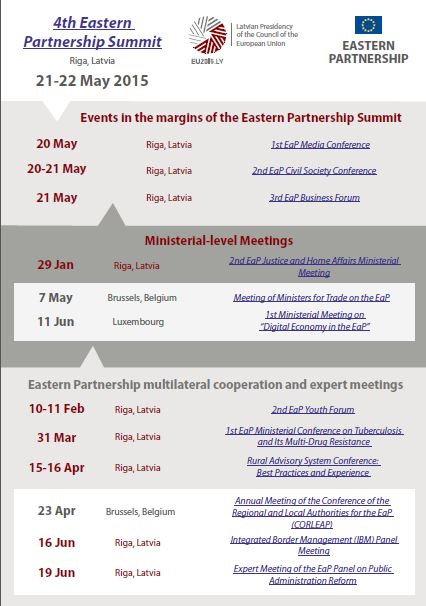The meeting will bring together the political leadership of the 28 EU Member States and six EaP partner countries – Armenia, Azerbaijan, Belarus, Georgia, Moldova, and Ukraine – as well as the EU institutions, including Donald Tusk, President of the European Council, and Jean-Claude Juncker, President of the European Commission.
The Riga Summit is expected to confirm the strategic importance of the EaP policy as a specific dimension of the European Neighbourhood Policy. The Summit will also address the current issues and challenges related to the implementation of the EaP and outline the main directions in the EU’s cooperation with partner countries in the coming years.
The Riga Summit will be launched on 21 May by an official working dinner for heads of EU and EaP Member States. The Summit’s Plenary Session will take place at the Latvian National Library on 22 May to be followed by a press conference. The Summit is expected to issue a joint declaration that will review the achievements so far and map out the priorities and goals of the EaP with a view towards the next summit.
It is expected that one of the key political messages of the Summit will be to confirm the strategic significance of the EaP policy and emphasise readiness to develop and deepen the EU’s bilateral relations in a differentiated manner with each of the six partner countries on the basis of jointly formulated priorities.
The multilateral framework of the EaP policy ensures a common platform for building sectorial cooperation at various levels and engagement of the wider public in cooperation. The Summit will underscore the EaP policy-making principles – a partnership based on openness, transparency and shared goals, and emphasise the fact that the EaP is neither confrontational nor directed against any third parties.
The Riga Summit will be the first since the signing of the Association Agreements between the EU and three partner countries – Georgia, Moldova and Ukraine. These agreements provide for closer political association and economic integration between the EU and those countries. The Summit will review the preliminary results of the provisional application of the Association Agreements. Successful implementation of the agreements will be one of key priorities in the EU’s relations with Georgia, Moldova and Ukraine, which will enable these partner countries to modernise their economies and social system.
The EU will pledge strong political and practical support for the application of the Association Agreements. Latvia believes that the signing and implementation of the Association Agreements in the three partner countries will form a sound basis for deepening relations between the EU and Georgia, Moldova and Ukraine. If the implementation of the Association Agreements is successful, Latvia is open to the consideration and introduction of further forms of integration with the partners.
The Summit will also explore the development of opportunities offered by the EaP policy in cooperation with the other three partner countries – Armenia, Azerbaijan and Belarus. The EU will confirm its readiness for a more tailor-made approach in its dialogue with these partner countries, deepening mutually beneficial cooperation with each of them.
The Riga Summit will provide a platform for taking stock of the progress made with each of the six partner countries since the third Eastern Partnership Summit in Vilnius in the areas such as mobility (visa facilitation and short-term visa waiver), sectorial cooperation, EU support for reforms in the partner countries, the development of people-to-people contacts, as well as cooperation in energy, transport and other fields.
The summit discussion at the highest political level will also provide additional input to the report on the review of the European Neighbourhood Policy.
Three high level side-events will take place as part of the EaP Summit in Riga:

On 21 May, the Third Eastern Partnership Business Forum will continue an established tradition and focus on intensification of business contacts between companies in the European Union and in EaP countries.
- On 20-21 May, at the Second Eastern Partnership Civil Society Conference, representatives of non-governmental organisations, experts, politicians and government officials from EU Member States and the EaP region will speak about strengthening the role of civil society in the partner countries.
Infographic: Eastern Partnership events in the margins of the EaP Summit
Media accreditation for all Eastern Partnership events on the following page of the Latvian Presidency website - EU2015.LV.
Eastern Partnership in bullet points
- The Eastern Partnership (EaP) is one of the two dimensions of the European Neighbourhood Policy (ENP). The ENP was developed in 2003 to forge closer relations between the EU and its neighbouring countries thereby promoting welfare, stability and security in the region as a whole. The ENP is underpinned by the values of democracy, the rule of law and human rights.
- With a view to strengthen the ENP’s regional dimensions, in May 2009 in Prague, the Heads of State and Government of the EU and eastern partner countries took the decision to establish the Eastern Partnership. One of its aims was to promote political association and economic integration with the EU’s eastern neighbours.
- In addition to the EU Member States, the Eastern Partnership involves Armenia, Azerbaijan, Belarus, Georgia, Moldova, and Ukraine.
- The EaP has two dimensions: the bilateral, which covers bilateral cooperation between the EU and a partner country, and the multilateral, which provides a common platform for cooperation in the 28+6 format in a number of sectors.
- The first EaP Summit took place in Prague (Czech Republic) in 2009 and laid the foundation for a common and shared policy platform to develop the EU’s cooperation with the six partner countries. The second EaP Summit, held in Warsaw (Poland) in 2011, focused on the need for a differentiated approach in the EU’s relations with its partners and highlighted the significance of sectorial cooperation. The third EaP Summit in Vilnius (Lithuania) in 2013 marked a new stage in the development of the EaP policy with the initialling of the Association Agreements with Georgia and Moldova.




